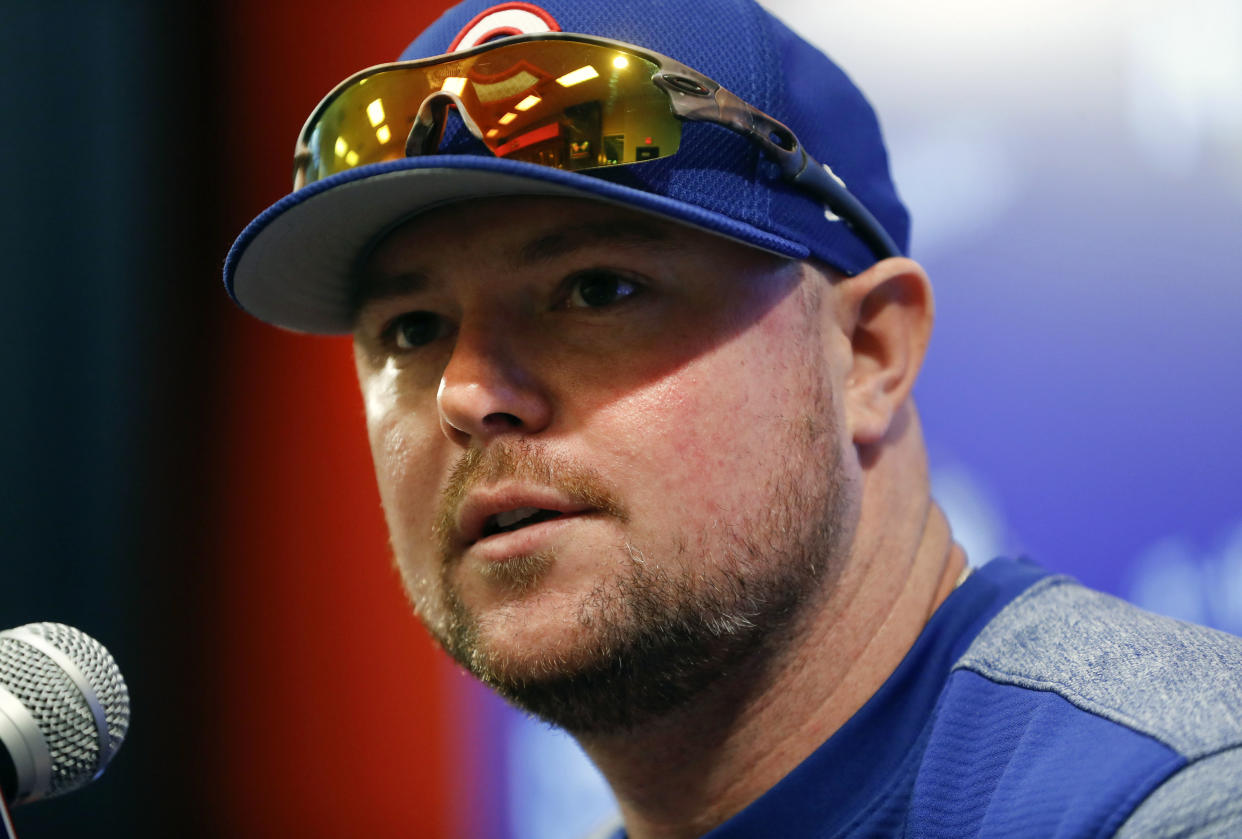This Cubs pitcher is secretly one of MLB's most charitable players

CHICAGO — In a small cubby just to the right of Jon Lester’s uniform, there sits an autographed baseball. The signature on the ball faces the clubhouse, giving anyone who walks by Lester’s locker an opportunity to see the name of a person Lester admires greatly.
The ball isn’t signed by an actor or musician. It’s not signed by one of Lester’s teammates, either. It’s signed by Ashlyn Clark, a 17-year-old softball player who hit her first home run this summer while undergoing treatments for Stage 4 Non-Hodgkin’s Lymphoma. After seeing Clark’s story on Twitter, Lester invited Clark and her family to Wrigley Field to enjoy a Chicago Cubs game. In his tweet, Lester asked Clark for her autograph. Cubs fans should be familiar with that story, as it garnered attention on social media.
That’s not typical for the 35-year-old Lester. He’s the Cubs’ nominee for the 2019 Roberto Clemente Award — which honors the player who combines strong play on the field with exceptional work in the community — but would rather operate behind the scenes, making him secretly one of the most charitable players in Major League Baseball.
“I don’t really care if anyone knows about it,” Lester told Yahoo Sports. “I do it because I want to help and I don’t need it out in the open.”
Those around MLB have been aware of Lester’s charitable work for years. This is the second consecutive season Lester has been nominated for the Clemente Award. He was also nominated for the award in 2012, when he was a member of the Boston Red Sox.
Lester’s connection to pediatric cancer is personal. He was diagnosed with lymphoma just a few months after making his major-league debut in 2006. Lester started chemotherapy in September. He was considered cancer-free in December, and was able to get back in time for spring training in 2007. Lester eventually worked his way back, returning to the majors that July. He hasn’t looked back since.
Giving back wasn’t something that initially came to Lester’s mind as he was undergoing treatment. He was still young and hadn’t established himself in the majors. That was his main focus once he was cleared to return.
His desire to help others came in 2012. That’s when he established NVRQT (Never Quit). The organization is aimed at raising money and awareness for pediatric cancer research. Lester prefers a lot of his work with NVRQT happen away from the cameras.
Knowing this, the Cubs had to trick Lester just to get him in the team’s video announcement of Lester’s Roberto Clemente Award nomination. The team told Lester he would be filming a retirement video for New York Yankees starter CC Sabathia. When Lester arrived, they sat him down, put an iPad in front of him and played this video.
In addition to those instances, Lester organizes Road Rallies through NVRQT at opposing ballparks. The events bring kids who are undergoing treatment for cancer at local hospitals out to the ballpark to hang out with Lester. In 2019, Lester managed to hit the last remaining stadiums on his list. Lester also hosts charitable events around Thanksgiving and Christmas every year.
Lester doesn’t shy away from talking about the work he does. He’s happy to answer questions when asked, he’s just not going to bring it up on his own.
It’s a different approach than the one taken by Lester’s teammate, Anthony Rizzo. The 30-year-old Rizzo — who battled Hodgkin’s lymphoma in 2008 — is one of the biggest public faces of charitable giving in MLB. He’s donated millions of dollars to a local hospital in Chicago and regularly visits hospitals to interact with patients going through treatment. Rizzo won the Roberto Clemente Award in 2017. Shortly after Rizzo was diagnosed, he and his family spoke to Lester about what to expect from treatment.
Though Lester and Rizzo go about their giving in different ways, Lester sees what Rizzo does as invaluable. Lester also admits it’s something he has a tough time doing himself because it takes a toll on him mentally.
“I have a hard time going to hospitals and seeing anybody,” Lester says. “Whether it be my family members or kids that are going through this or friends or whatever. I’m very envious of how Rizz does that on a really daily, monthly basis. I tell him all the time, ‘Man, you handle that, I’ll do this stuff.’”
Lester’s baseball legacy is secure. He’s built a Hall of Fame career, and delivered World Series titles to two franchises — including one that hadn’t won in 108 years. When his career is over, he wants teammates to remember him fondly and tell stories about him when he’s no longer a part of the clubhouse.
He wants something similar when it comes to his charitable work.
“I want those people that we’ve affected to remember that we helped them,” he says. “Just to hear the thank you’s from those people is more important to me than any award will ever be.”
———
Chris Cwik is a writer for Yahoo Sports. Have a tip? Email him at christophercwik@yahoo.com or follow him on Twitter! Follow @Chris_Cwik
More from Yahoo Sports:

